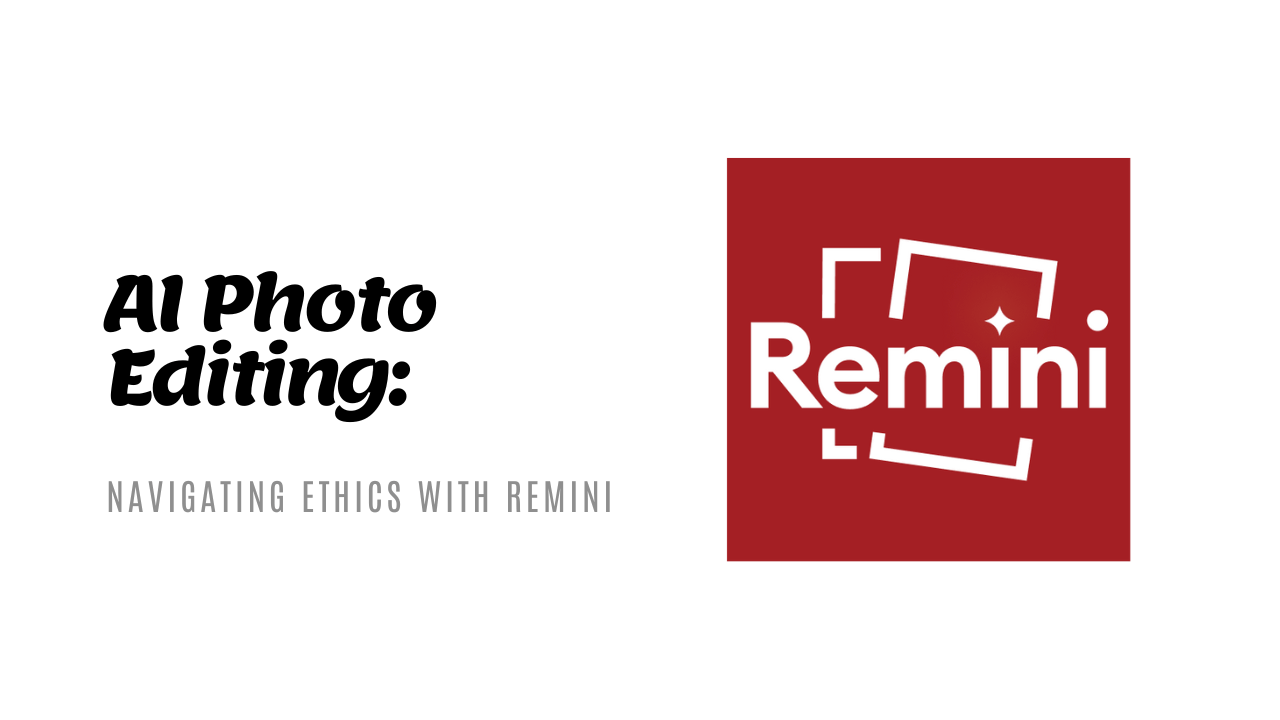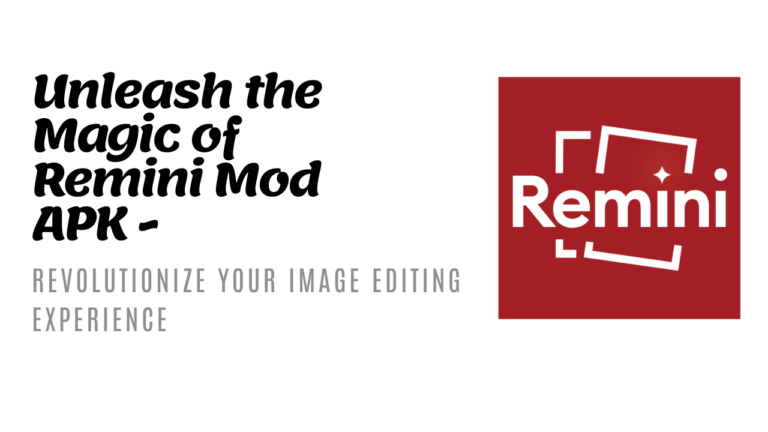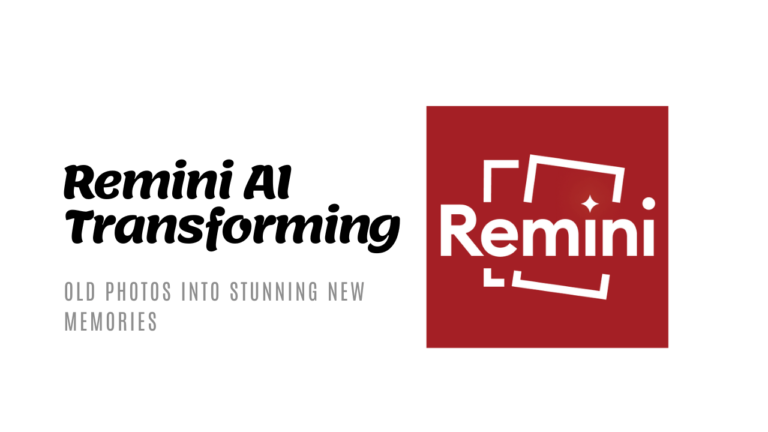AI Photo Editing and Ethics- Examining the Remini Effect

AI photo editing tools like Remini are game-changers in transforming ordinary photos into stunning visuals. Yet, these advanced tools come with their own set of ethical concerns. Are you aware of the ethical implications of using AI to enhance your images?
For starters, there’s the issue of authenticity. Using AI to touch up photos can lead to unrealistic representations of people and places. This might seem harmless, but it can contribute to harmful beauty standards and mislead viewers about what’s genuine.
Privacy is another significant concern. When you upload photos to AI editing apps, you might be giving away personal data without fully understanding the consequences. These images can be stored, shared, or even used to train AI models, raising questions about consent and data security.
AI photo editing also touches on the issue of intellectual property. Who really owns the modified image—the original creator or the AI tool that edited it? These blurred lines can lead to disputes and misunderstandings.
As you dive deeper into this topic, you’ll learn how to navigate these ethical waters while still enjoying the incredible capabilities of tools like Remini.
Authenticity and Misrepresentation
In today’s digital age, the use of AI photo editing tools like Remini raises important ethical considerations. Let’s delve into the impact on authenticity and the risks of misrepresentation when altering images using these advanced technologies.
Impact on Authenticity
The widespread use of AI photo editing tools has significant implications for the authenticity of visual content. While these tools can enhance photos and correct imperfections, they also have the potential to blur the lines between reality and fiction. Images altered with AI can distort the true representation of individuals, places, and events, leading to a loss of authenticity in visual storytelling.
Furthermore, the ease of manipulating photos with AI filters can create a distorted perception of beauty standards and unrealistic expectations. This alteration of reality through edited images can affect how individuals perceive themselves and others, impacting self-esteem and body image.
It is essential to consider the ethical implications of using AI tools to alter photos and the importance of preserving authenticity in visual content creation.
Risks of Misrepresentation
Misrepresentation through edited photos poses a range of risks, both on a personal and societal level. When individuals modify their own photos using AI tools to present an idealized version of themselves, it can lead to a disconnect between online personas and real-life identities. This discrepancy can contribute to feelings of inadequacy and the pressure to maintain unrealistic appearances.
Moreover, the intentional misuse of AI editing tools to deceive others or spread misinformation can have harmful consequences. From creating fake news images to altering historical photographs, the risks of misrepresentation through edited photos extend beyond individual impact to shaping public perception and distorting historical truth.
It is crucial to recognize the ethical responsibility that comes with using AI photo editing tools and to consider the potential risks of misrepresenting oneself or others through digitally altered images.
By navigating the fine line between enhancing visual content and preserving authenticity, users of AI photo editing tools like Remini can promote transparency and integrity in the digital landscape. Striking a balance between creativity and ethical considerations is key to ensuring the responsible use of technology in visual storytelling.
Privacy and Data Security Concerns
In the digital age, safeguarding your privacy and personal data is paramount, especially when using AI photo editing tools like Remini. Understanding how these tools handle and store your data is crucial to maintaining your online security.
Data Usage Policies
Before utilizing AI photo editing tools, it’s essential to review their data usage policies. By comprehending how these tools manage user data and images, you can make informed decisions about the information you share. Some AI tools may store images on external servers, raising concerns about data privacy.
It’s advisable to opt for tools with transparent policies on data handling and encryption practices to protect your sensitive information.
Potential Risks of Data Breaches
One of the primary concerns when using AI photo editing tools is the potential risk of data breaches. In the event of a breach, unauthorized parties may gain access to your personal information, including images, exposing you to privacy violations. It’s crucial to be cautious and selective about the tools you use, opting for reputable options with a proven track record of data security.
Regularly updating your software and exercising caution when sharing sensitive images can help mitigate the risks associated with data breaches.
 Photo by Negative Space
Photo by Negative Space
Social and Psychological Impact
In today’s digital age, the increasing use of AI photo editing tools like Remini raises ethical concerns regarding their social and psychological impact. Let’s delve into how these tools can influence various aspects of our lives.
Body Image Concerns
Edited photos often portray unrealistic beauty standards, leading to concerns about self-esteem and body image perceptions. The prevalence of retouched images on social media platforms can create a distorted view of beauty, causing individuals to compare themselves to unattainable ideals.
This constant exposure to perfected images may contribute to feelings of inadequacy and dissatisfaction with one’s appearance. It’s essential to realize that these manipulated images do not represent reality and embrace diversity and authenticity.
Influence on Perception
The widespread use of AI photo editing tools can distort reality and influence societal perceptions of beauty standards. Edited images can create a false sense of what is considered beautiful, perpetuating unattainable beauty norms. This distortion can impact how individuals perceive themselves and others, affecting mental well-being and contributing to a culture of comparison and judgment.
It’s crucial to question the authenticity of heavily edited images and celebrate genuine beauty in all its forms.
As technology continues to advance, it’s vital to consider the long-term effects of relying on AI tools to alter images. Understanding the social and psychological implications of edited photos can help promote a more realistic and inclusive representation of beauty in the digital world. Remember, true beauty lies in authenticity and self-acceptance.
Legal and Regulatory Considerations
Navigating the realm of AI photo editing tools like Remini brings forth a myriad of legal and regulatory considerations that users must be aware of. Understanding the implications of such tools on intellectual property rights and how they align with advertising standards is crucial in ensuring ethical usage.
Intellectual Property Rights
AI-edited photos can raise complex issues surrounding intellectual property rights and ownership. When using AI tools like Remini to enhance or manipulate images, it’s essential to consider how these edits impact the original creator’s rights. The transformed image may involve copyrighted elements, sparking debates on ownership and fair use.
Users must be cautious not to infringe on existing intellectual property rights when altering images through AI technology.
Advertising Standards
In the fast-paced realm of digital advertising, edited images play a pivotal role in capturing audience attention. However, it’s vital to adhere to advertising standards and regulations that govern truth in advertising. When employing AI photo editing tools for promotional purposes, users must ensure that the edited visuals comply with guidelines on transparency and accuracy.
Misleading enhancements or alterations could breach advertising standards, leading to repercussions for brands and marketers.
As you embark on your photo editing quests using AI tools like Remini, understanding the legal and regulatory landscape is paramount. By leveraging these technologies ethically and abiding by intellectual property rights and advertising standards, you can navigate the evolving digital realm responsibly and contribute to a seamless online environment for all users.
Conclusion
AI photo editing tools like Remini offer powerful ways to enhance your images quickly and easily. But with great power comes great responsibility. Using these tools raises ethical questions. Are you misrepresenting reality? Are you altering your photos in a way that could mislead others?
It’s crucial to use these tools mindfully. Strive for authenticity and honesty in your edits. Over-editing not only affects how others perceive your photos but can also skew your self-image.
Be responsible. Think about the impact of your edits on both yourself and your audience. Ethical editing practices ensure that you stay true to your values while still enjoying the benefits of AI technology.






